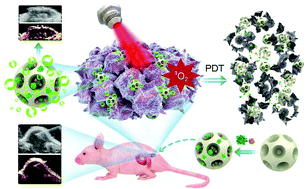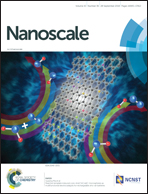A catalase-loaded hierarchical zeolite as an implantable nanocapsule for ultrasound-guided oxygen self-sufficient photodynamic therapy against pancreatic cancer†
Abstract
Photodynamic therapy (PDT) is an alternative strategy for treating pancreatic cancer (PC) in clinics. However, the therapeutic efficacy is generally suppressed by inadequate oxygen supply in the hypoxic tumor microenvironment. Herein, hierarchical zeolite nanocarriers with hydrophilic mesoporous nanostructures and excellent biodegradability are synthesized via a one-pot wet chemical method. By co-loading with catalase and methylene blue (MB), a new type of oxygen self-sufficient PDT platform, a zeolite-catalase-MB nanocapsule (ZCM nanocapsule), is developed. After precision implantation of the ZCM nanocapsule into the tumor area under the real-time ultrasound (US) imaging guidance, the nanocapsule with 90% relative activity of equivalent free catalase enzyme efficiently modulates the tumor hypoxia and enhances the intratumoral US contrast by sustained decomposition of endogenous H2O2 and in situ production of O2 gas bubbles. Meanwhile, the MB loading in hierarchical zeolite matrices prevents the rapid leaching of the photosensitizer in tumor tissue, achieving a good sustained photosensitizer release effect. Based on the synchronous mechanisms, upon near-infrared laser irradiation, the local PC cells are completely killed, and no therapy-induced toxicity and recurrence are observed. This highly biocompatible and biodegradable hierarchical nanozeolite would further facilitate the development of catalase-based catalytic nanomedicine for enhancing chemotherapy, radiotherapy and combination therapy.



 Please wait while we load your content...
Please wait while we load your content...